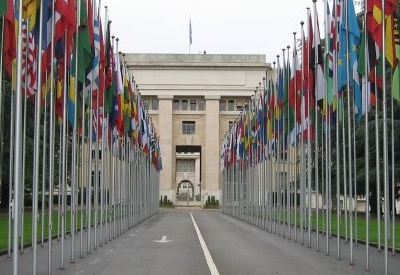Envocracy in Tibet
Michael Buckley, the Canadian Tibetologist
has witnessed the mass deforestation of
Tibet where “half the forests of eastern
and southern Tibet” have been eviscerated
by its Chinese denizens. Buckley continues:
“…over 50% of Tibet’s forests have
disappeared since China invaded Tibet” …
while “over 50 billion worth of oak, pine,
larch, and rhododendron has been logged
and hauled out to mainland China.”1 Given
the vast amount of resources shipped out
of Tibet as Buckley notes, consideration
must be accorded to mining, and the loss
of employment opportunities to native
Tibetans due to the sinicization of Tibet
since the occupation. As mentioned earlier,
China has invested 100 billion in the region
through subsidies, though, it is the present
damage and long term consequences of its
actions that are difficult to calculate. As
Tibet is native to “46,000 glaciers” it has the
third largest cluster of ice in the world after
the north and south poles, thereby earning
the title of Third Pole.
Capitalism is the antecedent economic
structure to communism dating back to
the Middle Ages in Western Europe.
However, as Capitalism has evolved and
innovation advanced rapidly, the
difficulties associated with technological
innovation have laid waste to the
environment that protects humans and
provides for our sustenance. In the 21st
century, particularly in North America and
notably in Ontario (including China’s
Socialist command economy), the notion
of a kleptocracy or envoccrraccy 2 ,within
those economic structures is prevalent.
Ontario Canada is a good example of a
burgeoning envocracy with the provincial
government having wasted millions of tax
payer dollars on the purported switch
from coal to gas powered plants and now a
looming carbon-tax. The notion of a
kleptocracy in Capitalist states is perhaps a
bit pedantic, though the notion of porkbarrel
politics lends some credibility to
American and Canadian politics.The
strength of a kleptocracy can be found in
Russia today as President Putin has
amassed large sums through state
coffers.Indeed, the Panama Papers
suggest that Putin and his associates have
benefited from 2 billion through off shore
activities. Talk about pork. Yet, to keep
those Russian denizens on his side, he
annexed Crimea to speak to former
Russian pride, real or imagined. So, the
reality of politics and the benefits of
working within that sphere are
unmistakable in cosmopolitan centres, no
matter the continent. The basis or crux of
this discussion is the effect of China’s
occupation of Tibet on its environment and
culture. As mentioned above Buckley notes
well of China’s plundering of Tibet’s
resources for economic gain in China (I
don’t consider Tibet part of China, though
that it is, is accepted in the international
community) and will continue to build rail
links and provide employment
opportunities for Han Chinese that choose
to migrate to Tibet for the vast enjoyment
of state benefits at the expense of
compromised health due to the high
altitude. Instances of women returning to
mainland China to complete their
pregnancies due to the effects of high
altitude difficulties are well documented.
One has to be born into these
circumstances in order to adjust to the
environment. Everest is a prime example
where sherpas are employed as guides to
those individuals who chose to scale the
mountain. Everest has a Nepal side and a
Tibet (China) side, so, the economic
advantages prevail for both parties. In fact,
these same Panama Papers have
implicated President Xi and other
members of the Politburo for hiding assets
in off-shore accounts. Ironically, Xi came
into office on the promise to eradicate the
graft and prosecute those public officials
“capitalizing” on Chinese resources on the
mainland or Diaspora. The system is
heavily weighted in those command
economies or a managed democracy such
as Russia’s for mass corruption by public
officials.
In order to mitigate against supporting
these regimes, the difficult decision to
attach conditions reflecting human rights
through trade agreements with these
states, seems be the only way to catch
their attention. Currently, the quagmire of
trade and political associations can be
found through Brexit and the separation of
state from union. No doubt Britain will be
ostracized within the EU and will need to
forge new trade deals outside of this zone
in order to revitalize it’s economy and
strengthen their voice once again, in
foreign policy decisions. Streaming away
from Chinese goods towards Britain and
other nation-states without human rights
issues provides Canada, in particular, a
great opportunity to expand its foreign
policy without curry favouring to the UN
for a seat on the Security Council, which is
long overdue for expansion from a post
WW2 club of five permanent members,
that remains in this form to the present
day. Canada, though still a crown nationstate
would do well to create a
Department of Collective Security whose
sole purpose would be to collaborate with
the United Nations P5 in order to find
Canada a seat on the UN in a permanent
role, alongside the United States. After all,
Canada will celebrate its 150th anniversary
in 2017. What better way to illustrate to
the world a stronger and more
independent Canada, that can flex its
foreign policy muscles in order to affect
positive change in other parts of the world,
including the Near East and Tibet. In the
meantime, consumers ought to purchase
American, Canadian or goods from nationstates
that pursue freedom of speech as
the vanguard of human rights and utilize
this as a potential pressure point to work
with the Tibetan Government in Exile on a
power-sharing doctrine that is meaningful.
In this way, the Chinese envocracy can be
minimized in Tibet and China, while
pushing innovation to protect the
environment and the public purse.While
China has invested heavily in Tibet, it has
taken out more in resources for the
mainland while a floating population of
between 150,000 – 200,000 Tibetans have
left for larger urban centres in Beijing,
Shanghai, and Guangzhou to pursue new
opportunities, according to
CRIENGLISH.COM.3 The traditional Tibetan
way of life for centuries has been
circumvented due to China’s occupation
and oppression. To further illustrate this
case, a Chinese work-team surfaced at
Larung Gar, the largest Buddhist teaching
facility in Tibet on July 20 with heavy
equipment to demolish parts of the
monastery and academy because they feel
overcrowding is an issue, “with only 1,500
monks and 3,500 nuns allowed to live on
the site” by October 2017. A student at
Larung Gar disputed the authenticity of
China’s claims with overcrowding that
already exists in towns and cities across
China.4
Works Cited
1.Buckley, Michael. “Meltdown in Tibet.”
New York: Palgrave/McMillan. 2014.
2.Kieswetter, Kevin. Envocracy def.
“a nation-state that advocates
democratic principles for its subjects in the
realm of the environment; though,
eschewing in practise those very elements
that underlie good and fair governance in
the name of environmental protection,
and/or urbanization.”
3.Zhou Yan and Sun Yang.”Tibetans Leave
Home to Seek New Opportunities.”
03.14.2012. 02.07.2016.
<http://english.cri.cn/6909/2012/03/14/312
3s686949.htm>.
4.Demolitions Begin at Larung Gar.
freeTibet. 21 July 2016. 28 July 2016.
<http://www.freetibet.org/newsEnvocracymedia/na/demolitions-begin-larung-gar?
mc_cid=e5d205c329&mc_eid=4ff30258c7>.FROM JULY 3 2016





